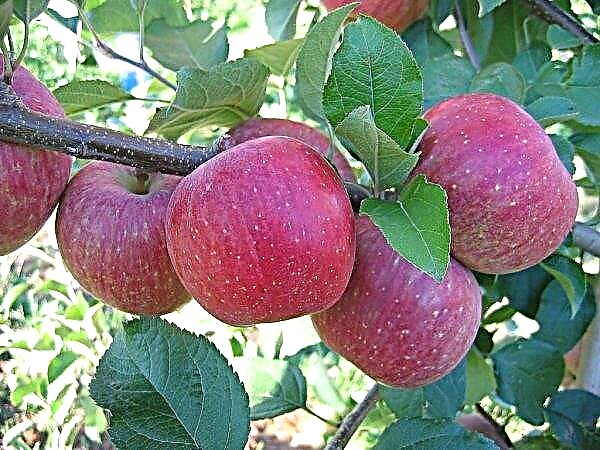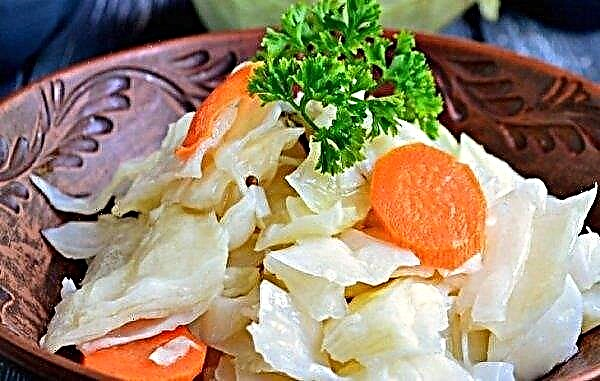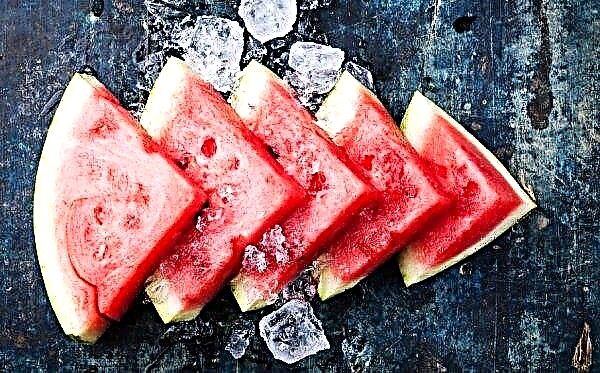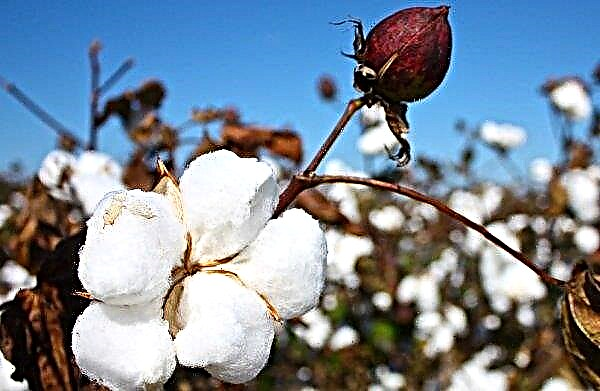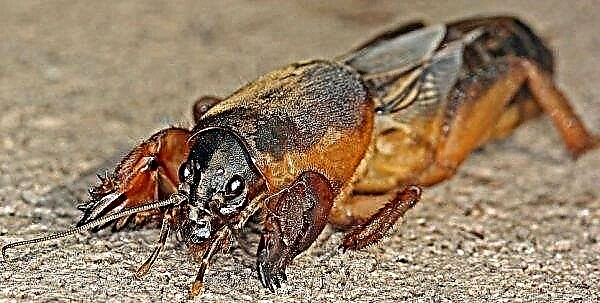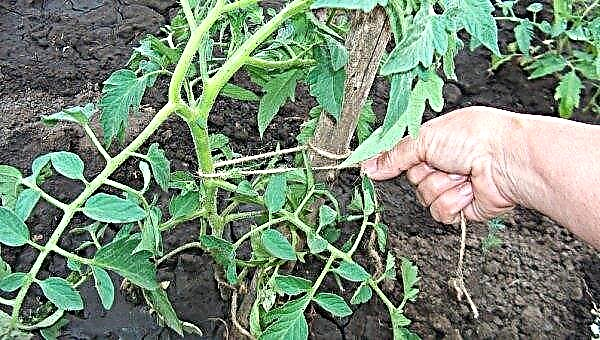There are legends about the benefits of honey, and everyone knows that the healing properties of this unique delicacy largely depend on the raw materials from which it is prepared. However, there are special compounds in which honey is combined with other components, as a result of which the value of the product is greatly enhanced. A vivid example of this is Apitonus, also known as Abkhazian honey, which will be discussed.
Did you know? The most expensive honey in the world is made in Turkey, near the city of Artvin. This honey is called "Elven", appreciated due to the unique mineral composition of the local caves where bees nest, and costs about 5,000 euros per kilogram.
What is Apitonus?
Strictly speaking, calling Apitonus honey is not entirely true. It is really about a beekeeping product, however, in addition to honey as such, it includes some additional components. That is why Apitonus is often called a healing elixir. In particular, according to manufacturers, Apitonus is mixed in strictly defined proportions:
- pure natural honey (in the original product - only chestnut);
- flower pollen;
- royal jelly (bee and drone);
- propolis tincture;
- beeswax;
- chitosan is a special natural polysaccharide obtained from chitin contained in the shell of crustaceans and spiders, as well as in the outer cover of insects.
 Such an amazing elixir is created in the apiaries of the mountainous regions of Abkhazia, where a favorable climate combining clean air, long summers with warm but not hot weather, and rich mountain vegetation contributes to the creation of high-quality and environmentally friendly beekeeping products.
Such an amazing elixir is created in the apiaries of the mountainous regions of Abkhazia, where a favorable climate combining clean air, long summers with warm but not hot weather, and rich mountain vegetation contributes to the creation of high-quality and environmentally friendly beekeeping products.The main raw materials for the manufacture of Apitonus are nectar and pollen of chestnut (not horse, but real, whose fruits are edible). The flowering period of this tree in Abkhazia falls at the end of May - the first decade of July. It was at this time that the main work on the preparation of a healing potion took place.
Did you know? To produce one gram of honey, a bee has to fly around a hundred flowers, while the insect is so tired during the “working day” that more than half of the collected nectar is eaten on the way back to the hive.
Chemical and vitamin composition
The basis of Apitonus is sugar and water, and only a few percent account for other biologically active components. But even this small amount, thanks to the amazing balance and huge variety of nutrients (more than 300 items), is enough to talk about the significant value of the drug.
Taking into account the composition of the products that make up Apitonus, we can say that this elixir is rich in:
- Vitamins. Compared to vegetables and fruits, there are not very many vitamins in Apitonus, but still it is a source of ascorbic acid and a number of B vitamins, in particular folic and pantothenic acids, niacin, riboflavin, biotin, thiamine and pyridoxine.
- Minerals Among them are potassium, iron, magnesium, phosphorus, cobalt, calcium, zinc, copper, chromium, sodium, iodine, sulfur and many others.
- Amino acids, interchangeable and irreplaceable. Their composition includes more than two dozen items, including arginine, lysine, asparagine, valine, proline, hydroxyproline, cysteine, glutamine, isoleucine, leucine.
- Organic acids such as apple, oxalic, amber, wine, dairy, gluconic, etc.
- Enzymes among which amylase is especially important. It is also worth mentioning the phosphatase, glucooxidase, cholinesterase, invertase, catalase, ascorbin oxidase, protease, diastase, polyphenol oxidase present in the product.
- Other biologically active components including essential oils, flavonoids, phytoncides, immunoglobulins, hormones.
Useful and healing properties
Thanks to the combined action of honey, propolis, royal jelly and other components, Apitonus has a huge number of useful properties.
- Including:
- is the strongest antioxidant and immunomodulator;
- accelerates all metabolic processes in the body;
- tones up, strengthens, invigorates, increases working capacity and relieves fatigue;
- improves eyesight;
- acts as a strong natural sorbent - removes toxins, salts of heavy metals, radionuclides from the body and all that is commonly called “slag”;
- stops inflammatory processes;
- destroys pathogenic microflora in the intestine, has a common bactericidal effect;
- improves the respiratory, cardiovascular, digestive and endocrine systems;
- increases hemoglobin, participates in blood formation processes;
- stabilizes reproductive function (used to treat many gynecological diseases, improves libido and potency, restores hormonal balance);
- strengthens the walls of blood vessels, as well as the heart muscle, prevents the development of sclerosis, normalizes blood pressure;
- beneficial effect on the functioning of the liver and kidneys;
- promotes early healing of wounds, is used for symptomatic treatment of prostatitis;
- improves cell regeneration, slows down the aging process;
- possesses anticancer activity;
- strengthens bones, accelerates their fusion in fractures;
- improves skin condition, which allows the use of the drug for the treatment of various dermatological diseases;
- stimulates the brain, improves memory, restores the nervous system;
- relieves pain, pregnancy and menopause;
- promotes rapid recovery after active drug treatment, including the use of antibiotics.
How to use
Enough has been said about the healing properties of Apitonus, however, since this is not just about a treat, but specifically about a medicinal drug, it is important to know how to take it to get the desired effect.
To strengthen immunity
The standard use of the elixir involves its use inside, and always on an empty stomach and in its purest form. Half an hour after ingestion, you should neither eat nor drink, after which a meal is recommended. The usual single serving is 1 tsp. If the drug is used in baby food, the dose should be halved. As an exception to the rule on the net intake of the drug, you can consider drunk a quarter of an hour before that 100 ml of mineral water without gas.
Important! Apitonus should never be diluted with water, much less hot. Even drinking the product is strictly not recommended.
Such a precaution for better absorption of the bee product should be used in the first stage of its use. A three-month course of taking the drug according to the specified scheme ensures the mobilization of the body's internal reserves, as a result of which enhanced immune defense allows a person to cope with external threats much more easily.
Wounds, cuts and other skin lesions
Along with internal use, Apitonus is often used externally as compresses or masks. This method allows you to accelerate the healing of wounds, purulent inflammation and other problems associated with a violation of the integrity of the skin or dermatology. External use of the elixir will give an even greater effect if you combine it with a standard intake. To prepare a compress, a cotton pad or a piece of gauze folded in several layers is abundantly lubricated with an elixir on one side and applied to the affected area of the skin, after which it is tightly fixed with a bandage or any other dressing. The exposure time is 2-3 hours. After this, the bandage can be removed and, if necessary, replaced with a new one. Such a tool not only prevents suppuration and stops the inflammatory process, but also accelerates wound healing.
To prepare a compress, a cotton pad or a piece of gauze folded in several layers is abundantly lubricated with an elixir on one side and applied to the affected area of the skin, after which it is tightly fixed with a bandage or any other dressing. The exposure time is 2-3 hours. After this, the bandage can be removed and, if necessary, replaced with a new one. Such a tool not only prevents suppuration and stops the inflammatory process, but also accelerates wound healing.
Did you know? The average flight speed of the bee is about 28 km / h, but the “loaded” insect flies about 20% slower. The number of wing flaps per second, respectively, is 440 in the first case and 300 in the second.
Face masks
A separate direction in the use of Apitonus is cosmetology. Honey as a main or additional component in various nutritional masks is used quite often, but if Apitonus is replaced in the usual recipe, the effect will be much better.
The most successful combinations for preparing masks with Apitonus are cow's milk (2 tbsp. For 1.5 hours of elixir), as well as lemon juice and a chicken egg (the yolk is used in the mask for wrinkles, protein is used in whitening and nutritious, to one or another add 1.5 hours Apitonus and juice of half a lemon). The resulting mixture is applied to cleansed and steamed face skin and left for 15-20 minutes, then washed off with plenty of warm water and immediately apply a rich layer of oily nourishing cream (otherwise there will be a feeling of tightness and dryness of the skin). The frequency of the procedure is 1-2 times a week.
The resulting mixture is applied to cleansed and steamed face skin and left for 15-20 minutes, then washed off with plenty of warm water and immediately apply a rich layer of oily nourishing cream (otherwise there will be a feeling of tightness and dryness of the skin). The frequency of the procedure is 1-2 times a week.
Contraindications and Precautions
Apitonus has only one absolute contraindication - allergy, that is, individual intolerance. You can add childhood to it: until two years old, any bee products are traditionally contraindicated for babies, and the danger of their use is associated not only with a possible allergy, but also with the risk of infection with Clostridium botulinum.
Did you know? The allegation of the high allergenicity of honey is greatly exaggerated. According to statistics, the individual intolerance of this product is expressed in no more than 8 out of 1000 people (for comparison: nuts cause allergies in 20 out of 1000 people, and milk allergy among children is found in 200 cases out of 1000 at all).
These anaerobic bacilli, the causative agents of deadly botulism, may be present in small amounts in bee products. For an adult, such a dose is not enough to become infected, but the child’s immunity may not be able to cope with the microbe. All other warnings for the use of Apitonus are relative, that is, they do not imply a complete exclusion of the product from the diet, but only increased caution when handling it.
- Such relative contraindications include:
- the period of pregnancy and breastfeeding (this is mainly due to the risk of an allergic reaction - both in the mother and the baby, although, on the other hand, Apitonus is sometimes specially prescribed to improve lactation);
- diseases of the digestive tract (gastritis, ulcers, pancreatitis) and adrenal glands in the acute phase;
- intestinal disorders;
- urolithiasis disease;
- acute viral or bacterial infections, as well as other conditions occurring against the background of an increase in body temperature;
- some mental illnesses, in particular alcoholism;
- some oncological diseases.

As for the precautions that must be observed when taking the drug, their set, in general, is standard, and it comes down compliance with such rules:
- If you have any doubts about the possibility of using the drug, you should consult your doctor before using it.
- Start taking a small dose and closely monitor the body's reaction (allergy is a disease that can start suddenly and at any age, no one is safe from it).
- If there are any side effects, the drug should be stopped immediately.
- Neither Apitonus, nor honey, nor other beekeeping products should be treated as a panacea that can cure any dangerous disease. It is only a product that can stimulate the internal forces of the body to fight. However, if the disease requires medical treatment, do not neglect the achievements of modern pharmacology, and Apitonus in this case can serve only as an additional component in the complex therapy.
Important! The only way with a high degree of probability to protect yourself from acquiring a fake is to buy Apitonus from a seller who is well-known or recommended by reliable people, on trusted sites or directly in Abkhazia, and it is better not in specialized retail outlets, but in mountain villages.
How to choose quality honey
There are standard rules to distinguish quality honey from fake. Briefly, they are as follows:
- When purchasing a product, you should always pay attention to the consistency of its current season. For example, rape honey crystallizes very quickly, in a maximum of four weeks. Rapeseed bloom in Ukraine lasts no longer than until mid-June. Thus, at the end of summer it is impossible to buy real rapeseed honey in a liquid state, and if such a product is sold it is a fake.
- The reason to refuse the purchase is the presence of a cloudy precipitate or foaming on the surface of honey. Such symptoms indicate that fermentation processes have begun in the product.
- Good honey is wound on a spoon and slowly flows down from it, forming a "hill". If a substance drips from a spoon, this is a fake.
- After slowly absorbing goodies in the mouth a slight bitter aftertaste should remain.
- Real honey does not soak bread and does not leave wet traces on paper. When rubbing between the fingers, no pellets should form, the “correct” substance is completely absorbed into the skin.
- The presence of blue in the substance, to which a drop of iodine was added, indicates that the product was thickened with starch.
- Each honey variety has its own physical characteristics - color, density, taste, aroma. You need to know them and carefully compare the product offered for purchase with those specific qualities that it must meet. In order not to make a mistake, it is nevertheless desirable to know how this or that honey should look, smell and taste not firsthand, but from personal experience. So, for example, a slight acidity should be present in Apitonus, but if the sour taste is stronger than is permissible, most likely, the honey included in the composition of the product began to deteriorate.
 However, all the recommendations mentioned above are very relative, especially when it comes to a product such as Apitonus. It costs much more than ordinary honey, which means that the temptation to fake such an “elixir” is much higher. The fact is that the quality of any beekeeping product depends on many factors, including those that cannot be determined “by eye”. We are talking about the breed of bees, and how they were fed (whether sugar syrup was added to the diet in order to save honey), and the state of the environment in the region where the bees collected nectar, etc.
However, all the recommendations mentioned above are very relative, especially when it comes to a product such as Apitonus. It costs much more than ordinary honey, which means that the temptation to fake such an “elixir” is much higher. The fact is that the quality of any beekeeping product depends on many factors, including those that cannot be determined “by eye”. We are talking about the breed of bees, and how they were fed (whether sugar syrup was added to the diet in order to save honey), and the state of the environment in the region where the bees collected nectar, etc.Important! It must be borne in mind that after the packaging is leaky and with each subsequent opening of the container, its contents are “lit up”, which sharply reduces the healing qualities of the product, therefore, when you start using Apitonus, it is best to do this as quickly as possible.
In appearance, taste, and even special chemical manipulations (as in the example with iodine), it is possible to establish the presence or absence of extraneous impurities in the product such as starch, flour, water, sugar syrup, as well as, with a certain degree of probability, the freshness of honey. But when it comes to a product with a large number of declared healing properties, this is not enough. It should also be noted that real Apitonus is usually packaged in clay pots with a wax-sealed lid.
Lightproof dishes and sealed packaging are an indispensable guarantee of the preservation of the healing properties of the elixir, and therefore this requirement is always respected by bona fide manufacturers. By weight, it is very likely that a fake is sold, but even if it is not, in this form Apitonus very quickly loses its qualities, and therefore it is better to refuse to buy it.
Storage rules
Honey is a long-term storage product. Actually, subject to the recommended conditions (dark, dry, draft-protected and well-ventilated place, stable temperature in the range + 5 ... + 10 ° С), it can be stored for years. But Apitonus, as was said, is not quite honey. So, for example, the shelf life of its propolis in any circumstances does not exceed seven years, and royal jelly can be stored for a maximum of two years, and only in sealed packaging. Thus, properly packed (in sealed and opaque containers, in no case metal or plastic) Apitonus should be stored under the same conditions as honey for two years. Most manufacturers increase this period to 36 months, but, taking into account what has been said regarding the shelf life of royal jelly, this statement is still somewhat questionable.
Thus, properly packed (in sealed and opaque containers, in no case metal or plastic) Apitonus should be stored under the same conditions as honey for two years. Most manufacturers increase this period to 36 months, but, taking into account what has been said regarding the shelf life of royal jelly, this statement is still somewhat questionable.
Among the many varieties of honey Apitonus occupies a special place. The composition of this unique product from Abkhazia includes additional natural ingredients, the complex effect of which significantly expands the range of healing effects of the drug. However, precisely because of its rarity and value, Apitonus is a very attractive object for various fakes, therefore, the issue of its acquisition should be treated twice carefully so as not to become a victim of unscrupulous manufacturers or outright scammers.

